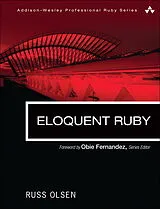Eloquent Ruby
Einband:
Kartonierter Einband
EAN:
9780321584106
Genre:
IT Encyclopedias
Autor:
Russ Olsen
Herausgeber:
Pearson International
Erscheinungsdatum:
11.02.2011
It's easy to write correct Ruby code, but to gain the fluency needed to write great Ruby code, you must go beyond syntax and absorb the Ruby way of thinking and problem solving. In Eloquent Ruby, Russ Olsen helps you write Ruby like true Rubyists doso you can leverage its immense, surprising power. Olsen draws on years of experience internalizing the Ruby culture and teaching Ruby to other programmers. He guides you to the Ah Ha! moments when it suddenly becomes clear why Ruby works the way it does, and how you can take advantage of this language's elegance and expressiveness. Eloquent Ruby starts small, answering tactical questions focused on a single statement, method, test, or bug. You'll learn how to write code that actually looks like Ruby (not Java or C#); why Ruby has so many control structures; how to use strings, expressions, and symbols; and what dynamic typing is really good for. Next, the book addresses bigger questions related to building methods and classes. You'll discover why Ruby classes contain so many tiny methods, when to use operator overloading, and when to avoid it. Olsen explains how to write Ruby code that writes its own codeand why you'll want to. He concludes with powerful project-level features and techniques ranging from gems to Domain Specific Languages. A part of the renowned Addison-Wesley Professional Ruby Series, Eloquent Ruby will help you put on your Ruby-colored glasses and get results that make you a true believer.
Autorentext
Russ Olsen’s career spans three decades, during which he has written everything from graphics device drivers to document management applications. These days, he diligently codes GIS, web service security, and process automation solutions. He spends much of his otherwise free time writing and speaking about programming, especially Ruby and Clojure. His first book was the highly regarded Design Patterns In Ruby (Addison-Wesley, 2007). He is also the lurking presence behind the Technology As If People Mattered blog at www.russolsen.com.
Inhalt
Foreword xix Preface xxi Acknowledgments xxv About the Author xxvii PART I: The Basics 1 Chapter 1: Write Code That Looks Like Ruby 3 The Very Basic Basics 4 Go Easy on the Comments 6 Camels for Classes, Snakes Everywhere Else 8 Parentheses Are Optional but Are Occasionally Forbidden 9 Folding Up Those Lines 10 Folding Up Those Code Blocks 11 Staying Out of Trouble 12 In the Wild 13 Wrapping Up 15 Chapter 2: Choose the Right Control Structure 17 If, Unless, While, and Until 17 Use the Modifier Forms Where Appropriate 19 Use each, Not for 20 A Case of Programming Logic 21 Staying Out of Trouble 23 In the Wild 25 Wrapping Up 27 Chapter 3: Take Advantage of Ruby's Smart Collections 29 Literal Shortcuts 29 Instant Arrays and Hashes from Method Calls 30 Running Through Your Collection 33 Beware the Bang! 36 Rely on the Order of Your Hashes 38 In the Wild 38 Staying Out of Trouble 40 Wrapping Up 42 Chapter 4: Take Advantage of Ruby's Smart Strings 43 Coming Up with a String 44 Another API to Master 47 The String: A Place for Your Lines, Characters, and Bytes 49 In the Wild 50 Staying Out of Trouble 51 Wrapping Up 52 Chapter 5: Find the Right String with Regular Expressions 53 Matching One Character at a Time 54 Sets, Ranges, and Alternatives 55 The Regular Expression Star 57 Regular Expressions in Ruby 58 Beginnings and Endings 60 In the Wild 62 Staying Out of Trouble 63 Wrapping Up 64 Chapter 6: Use Symbols to Stand for Something 65 The Two Faces of Strings 65 Not Quite a String 66 Optimized to Stand for Something 67 In the Wild 69 Staying Out of Trouble 70 Wrapping Up 71 Chapter 7: Treat Everything Like an ObjectBecause Everything Is 73 A Quick Review of Classes, Instances, and Methods 74 Objects All the Way Down 76 The Importance of Being an Object 77 Public, Private, and Protected 79 In the Wild 81 Staying Out of Trouble 82 Wrapping Up 84 Chapter 8: Embrace Dynamic Typing 85 Shorter Programs, But Not the Way You Think 85 Extreme Decoupling 89 Required Ceremony Versus Programmer-Driven Clarity 92 Staying Out of Trouble 93 In the Wild 94 Wrapping Up 96 Chapter 9: Write Specs! 97 Test::Unit: When Your Documents Just Have to Work 98 A Plethora of Assertions 101 Don't Test It, Spec It! 101 A Tidy Spec Is a Readable Spec 104 Easy Stubs 105 . . . And Easy Mocks 107 In the Wild 108 Staying Out of Trouble 110 Wrapping Up 113 PART II: Classes, Modules, and Blocks 115 Chapter 10: Construct Your Classes from Short, Focused Methods 117 Compressing Specifications 117 Composing Methods for Humans 121 Composing Ruby Methods 122 One Way Out? 123 Staying Out of Trouble 126 In the Wild 127 Wrapping Up 128 Chapter 11: Define Operators Respectfully 129 Defining Operators in Ruby 129 A Sampling of Operators 131 Operating Across Classes 134 Staying Out of Trouble 135 In the Wild 137 Wrapping Up 139 Chapter 12: Create Classes That Understand Equality 141 An Identifier for Your Documents 141 An Embarrassment of Equality 142 Double Equals for Everyday Use 143 Broadening the Appeal of the == Method 145 Well-Behaved Equality 146 Triple Equals for Case Statements 149 Hash Tables and the eql? Method 150 Building a Well-Behaved Hash Key 152 Staying Out of Trouble 153 In the Wild 154 Wrapping Up 156 Chapter 13: Get the Behavior You Need with Singleton and Class Methods 157 A Stubby Puzzle 158 A Hidden, but Real Class 160 Class Methods: Singletons in Plain Sight 162 In the Wild 164 Staying Out of Trouble 165 Wrapping Up 167 Chapter 14: Use Class Instance Variables 169 A Quick Review of Class Variables 169 Wandering Variables 171 Getting Control of the Data in Your Class 174 Class Instance Variables and Subclasses 175 Adding Some Convenience to Your Class Instance Variables 176 In the Wild 177 Staying Out of Trouble 179 Wrapping Up 179 Chapter 15: Use Modules as Name Spaces 181 A Place for Your Stuff, with a Name 181 A Home for Those Utility Methods 184 Building Modules a Little at a Time 185 Treat Modules Like the Objects That They Are 186 Staying Out of Trouble 189 In the Wild 190 Wrapping Up 191 Chapter 16: Use Modules as Mixins 193 Better Books with Modules 193 Mixin Modules to the Rescue 195 Extending a Module 197 Staying Out of Trouble 198 In the Wild 202 Wrapping Up 205 Chapter 17: Use Blocks to Iterate 207 A Quick Review of Code Blocks 207 One Word after Another 209 As Many Iterators as You Like 210 Iterating over the Ethereal 211 Enumerable: Your Iterator on Steroids 213 Staying Out of Trouble 215 In the Wild 217 Wrapping Up 218 Chapter 18: Execute Around with a Block 219 Add a Little Logging 219 When It Absolutely Must Happen 224 Setting Up Objects with an Initialization Block 225 Dr…

Leider konnten wir für diesen Artikel keine Preise ermitteln ...
billigbuch.ch sucht jetzt für Sie die besten Angebote ...
Die aktuellen Verkaufspreise von 6 Onlineshops werden in Realtime abgefragt.
Sie können das gewünschte Produkt anschliessend direkt beim Anbieter Ihrer Wahl bestellen.
Loading...
Die aktuellen Verkaufspreise von 6 Onlineshops werden in Realtime abgefragt.
Sie können das gewünschte Produkt anschliessend direkt beim Anbieter Ihrer Wahl bestellen.
| # | Onlineshop | Preis CHF | Versand CHF | Total CHF | ||
|---|---|---|---|---|---|---|
| 1 | Seller | 0.00 | 0.00 | 0.00 |
